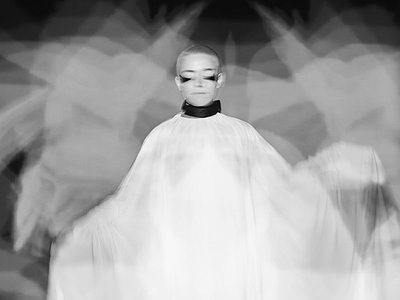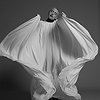Part 2
Could you describe your creative process on the basis of a piece or album that's particularly dear to you, please? Where did the ideas come from, how were they transformed in your mind, what did you start with and how do you refine these beginnings into the finished work of art?
Our latest single Pyramid is a very interesting case study, it’s also a really good example of a 50/50 collaboration between Ignacio and I. When I wrote the first demo I was listening to a lot of Thom Yorke and I was trying to do something more experimental and electronic. While sharing the files between each other, there was a mistake with the tempo, which resulted in a polyrhythm that became the key of the song. By chance, that polyrhythm was also connected with the meaning of the lyrics (the pyramid became the three-bar groups and the sphere became the four-bar groups). Ignacio was also able to produce it in a way where the contrast between those two concepts (pyramid and sphere) was always present in the sound: the pyramid is dark, beat-based and electronic versus the sphere that is more neoclassical, free, avant-garde and pop. Also, the voice has a very unusual treatment but it’s very expressive. All the little sounds and beats have their own tempo, as well. We’re very proud of the song.
There are many descriptions of the ideal state of mind for being creative. What is it like for you? What supports this ideal state of mind and what are distractions? Are there strategies to enter into this state more easily?
Something I’m trying lately is to force myself to get to the finish line and try to make the whole song in one sitting. If I get distracted or I say: “I’ll finish tomorrow”, chances are it will never get done or it will take me a year or more to finish. It’s way more exciting and fun to finish it (or almost finish it) in one afternoon. When it takes me a year or more, I start to hate the song, and that’s bad for the song because I’m not giving “her” what “she” deserves.
I also know that when I’m recording voices, it’s super important to me to create an atmosphere where I can totally focus on the lyrics and the feeling behind the song. It’s the same when I’m playing live. I have an obsession that If I’m not being honest or I’m not in the moment, it will show and people will notice. That’s why I end up crying in most of my recordings and sometimes in our live shows. It’s embarrassing but it’s also impossible for me to sing something I’ve written from the bottom of my being and not feel it and relive it.
How is playing live and writing music in the studio connected? What do you achieve and draw from each experience personally? How do you see the relationship between improvisation and composition in this regard?
For me, it’s completely different. Firstly, in the studio I’m alone 90% of the time, 10% of the time with Ignacio, and for Ignacio is the same. So, it’s a very intimate, self-reflective and self-centred experience. I cry, I feel excitement, self-doubt, boredom… it’s like facing your angels and demons each time.
Live shows are a social experience. We come together (us and the audience) to experience something and communicate through the language of music. It’s crazy what music can do between two human beings. We’ve been able to get to a super deep state of connection with a complete stranger (crying, laughing and everything in between) without saying a word, without even touching… only through music and that’s something that in normal circumstances, takes years or even a lifetime. Music is f*** amazing.
Both experiences are necessary for me. We’re social beings at the end of the day and even though I’m more an introvert, I do need to connect and feel things with other human beings. That’s why we publish music and art, we’re not just doing it for ourselves (even though it’s very effective as self-therapy) but to connect with others.
How do you see the relationship between the 'sound' aspects of music and the 'composition' aspects? How do you work with sound and timbre to meet certain production ideas and in which way can certain sounds already take on compositional qualities?
I think it’s totally reciprocal. You can start playing with a particular sound and that can take you into the making of a whole song based on that. Other times, a song is made from a purely “compositional” place, like a skeleton, very basic: piano and voice, or guitar and voice, and then you start adding sounds or even taking away the initial piano / guitar and it becomes something else. We approach music in both ways. As Northwest, we also love to use guitar in all sorts of ways but almost never as a normal guitar.
Our sense of hearing shares intriguing connections to other senses. From your experience, what are some of the most inspiring overlaps between different senses - and what do they tell us about the way our senses work? What happens to sound at its outermost borders?
Very cool question. Definitely, sight is the one that overlaps a lot with our music. We normally see music when we’re writing it or hearing it. I’m imagining scenes, colours, music videos, places, past moments of my life, fantasies… That’s why we give so much importance to the visual part of Northwest. We don’t know why that is, maybe because of our education, our love for cinema, maybe it’s something innate. All we know is that it feels nice and we want to be able to express both senses in this project. In my case, I also love to dance to the music so in a sense, touch comes into play.
Art can be a purpose in its own right, but it can also directly feed back into everyday life, take on a social and political role and lead to more engagement. Can you describe your approach to art and being an artist?
I’m not sure If I’m going to be able to answer this question or do it justice but I’ll try. The first thing that comes to my mind is: what is art? It’s very difficult to define it as it’s very difficult to define our minds (what is consciousness or thought?). We still don’t have a universal and tested answer to those questions. I can speak about what music means for me. Music is a really powerful language, like an Esperanto we all understand. I think I’m more myself in my music than when I talk or write and I also think, like I said before in a previous question, that music can achieve a really deep state of connection between two human beings much more quickly than language. It’s so much more exciting and cinematographic to see life through music, like for example walking through the streets listening to music is an incredible experience or driving while listening to a whole record can become a very valuable, vital and self-reflective experience.
It’s amazing to me to see that we still seem unable to properly value music in this current capitalistic and technological era, when music is so f*** valuable…maybe it’s so valuable that it’s priceless. I think about that a lot. I do believe people want to support the music they love, but sometimes how to do that can be unclear and that’s what we have to solve.
It is remarkable, in a way, that we have arrived in the 21st century with the basic concept of music still intact. Do you have a vision of music, an idea of what music could be beyond its current form?
I don’t think the concept of music is going to drastically change, like you said: the core of music, of what it means, is still the same now as hundreds of years ago. What I do believe is going to change is the ways we make music and the ways we listen to music. I’m really excited about the future. I’m excited about the role of virtual reality in music for example, I’m excited to find ways to properly support music through technology...






